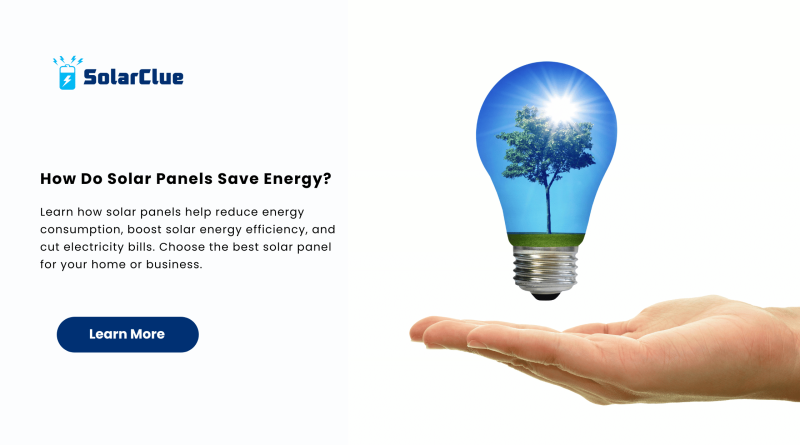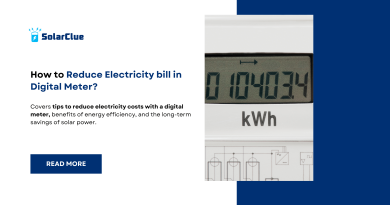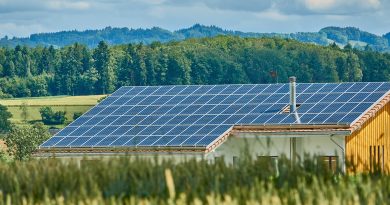How Do Solar Panels Save Energy?
As energy costs continue to rise and climate change intensifies, the world is turning to renewable solutions. At the forefront of this movement are solar panels, a clean, sustainable, and cost-effective way to power our homes and businesses. But how exactly do they help? More specifically, how do solar panels save energy?
This comprehensive blog will walk you through the mechanics of energy saving with solar panels, how to choose the best solar panel for your property, how to optimize your solar energy efficiency, and the long-term benefits of transitioning to a solar power system.
Table of Contents
- 1 What Does “Saving Energy” Mean in Solar Terms?
- 2 How Do Solar Panels Save Energy? Explained Step by Step
- 3 What Happens to Excess Energy?
- 4 Financial Energy Savings with Solar Panels
- 5 Case Study: How Solar Saved a Delhi Homeowner ₹80,000 Annually
- 6 Tips to Maximize Solar Energy Efficiency
- 7 Choosing the Best Solar Panel for Maximum Savings
- 8 Why Solar Is More Than Just Cost-Saving
- 9 Common Misconceptions About Energy Savings with Solar Panels
- 10 Environmental Savings = Energy Savings
- 11 Government Incentives to Help You Save More
- 12 Long-Term Benefits of Saving Energy with Solar
- 13 Final Thought: Is Solar the Future of Energy Saving?
- 14 Conclusion
- 15 FAQs
What Does “Saving Energy” Mean in Solar Terms?
When we talk about saving energy in the context of solar panels, we’re actually referring to two things:
1. Reducing Grid Dependency: By generating your own electricity, you consume less from the grid.
2. Minimizing Energy Waste: By using solar energy during peak hours, you reduce transmission losses and utilize power more efficiently.
So, by installing a solar panel for home or business use, you reduce your carbon footprint, slash your bills, and improve your overall solar energy efficiency.
How Do Solar Panels Save Energy? Explained Step by Step
1. Harnessing Free Energy from the Sun
Solar panels capture sunlight and convert it into DC electricity using photovoltaic (PV) cells. This energy is essentially free—once your system is installed, it doesn’t cost anything to produce electricity.
2. Converting and Using Solar Energy
The DC electricity produced is converted into AC through an inverter, making it usable for all your household or commercial appliances.
3. Powering Appliances Directly
During daylight hours, your solar power system powers your home directly, meaning you don’t draw power from the grid. This drastically reduces your energy bills.
4. Using Energy More Efficiently
Because solar power is generated and consumed on-site, it avoids energy losses that usually occur during long-distance grid transmission. This improves overall solar energy efficiency.
What Happens to Excess Energy?
One of the major solar panel benefits is the ability to manage excess energy. Here are your options:
1. Net Metering: Sell unused power back to the grid and receive credit on your electricity bill.
2. Battery Storage: Store excess power in batteries for use at night or during power outages.
3. Smart Load Management: Direct excess energy to appliances like water heaters or EV chargers.
Financial Energy Savings with Solar Panels
Let’s break down the actual monetary benefits:
1. A typical 3kW system can save ₹2,000–₹3,500 per month.
2. That’s ₹24,000–₹42,000 annually.
3. Over 25 years, savings range from ₹6–10 lakhs.
Even better, the best solar panel systems often pay for themselves in 3–5 years.
Case Study: How Solar Saved a Delhi Homeowner ₹80,000 Annually
Ramesh, a homeowner in Delhi, installed a 5kW solar panel for home. His monthly power bills dropped from ₹7,500 to ₹800. He used net metering and a battery to maximize his energy usage. Within 4 years, he recovered the full system cost and continues to save ₹80,000 annually—plus, he enjoys uninterrupted power even during outages.
Tips to Maximize Solar Energy Efficiency

1. Use Power During the Day
Schedule energy-intensive tasks like laundry, dishwashing, and air conditioning during daylight hours.
2. Install Energy-Efficient Appliances
Combine solar panel savings with LED bulbs, inverter ACs, and star-rated appliances for maximum results.
3. Monitor Usage with Smart Apps
Track your solar power system performance in real-time. Identify trends and optimize usage patterns.
4. Keep Panels Clean
Dirt and debris can reduce efficiency by up to 20%. Cleaning panels regularly ensures maximum energy generation.
Choosing the Best Solar Panel for Maximum Savings
Not all solar panels are equal. Here’s what to look for:
1. Efficiency Rating: Choose panels with 18% or higher.
2. Technology: Monocrystalline panels are often the most efficient.
3. Warranty: Look for 25 years or more.
4. Certifications: MNRE, BIS, IEC
5. Compatibility: Ensure it fits your inverter and system size.
Explore top-performing panels at solarclue.com to find the ideal fit for your home.
Why Solar Is More Than Just Cost-Saving
1. Reduces Peak Load on the Grid: Especially important in summer months when AC usage spikes.
2. Environmentally Sustainable: Solar emits no CO₂ during operation.
3. Increases Property Value: Homes with solar panels are more appealing to buyers.
Common Misconceptions About Energy Savings with Solar Panels
1. Myth: Solar panels don’t work in winters.
Fact: As long as there’s sunlight, panels generate power—even on cold or cloudy days.
2. Myth: Solar isn’t effective for small homes.
Fact: Even a 1kW system can make a big difference in small households.
3. Myth: Solar energy is unreliable.
Fact: With batteries and net metering, your energy flow can be stable 24/7.
Environmental Savings = Energy Savings
Saving energy doesn’t just reduce costs; it helps protect the planet:
1. A 5kW system offsets nearly 6 tons of CO₂ emissions per year
2. Equivalent to planting 150 trees annually
3. Reduces dependence on coal-fired power plants
Government Incentives to Help You Save More
1. Rooftop Subsidy: Up to 40% off on installation
2. Net Metering: Credits for feeding electricity back to the grid
3. GST Reduction: Reduced tax rates on solar products
Want help applying for subsidies? Visit solarclue.com for step-by-step guidance.
Long-Term Benefits of Saving Energy with Solar
| Benefit | Impact |
|---|---|
| Lower Bills | Save lakhs over 25 years |
| Independence | Less grid reliance |
| Reliability | Energy during outages |
| Green Living | Lower carbon footprint |
Final Thought: Is Solar the Future of Energy Saving?
Absolutely. When you ask how do solar panels save energy, you’re really asking: how can I take control of my energy use, lower my bills, and help the planet? The answer is simple—invest in a solar power system, choose the best solar panel, and make the switch today.
Conclusion
Now you understand how solar panels save energy, both financially and environmentally. By generating your own electricity, you reduce dependence on the grid, cut bills, and contribute to a greener world. With falling costs, rising panel efficiency, and attractive government incentives, there’s never been a better time to go solar.
Want to know how much you can save? Visit solarclue.com for custom quotes and support. And for more insights and energy-saving strategies, check out blog.solarclue.com — your one-stop destination for solar success.
FAQs
1. Can I go completely off-grid with solar?
Yes, with a large enough system and battery storage, you can be entirely energy-independent.
2. Do solar panels require a lot of maintenance?
No. Cleaning every 1–3 months and annual system checks are usually sufficient.
3. Will I still get an electricity bill?
Possibly, but it’ll be minimal—especially if you use net metering.
4. What is the average payback period for residential solar?
Typically 3–5 years in India with current subsidies and energy rates.
5. Are solar panels good for apartment buildings?
Yes, common areas and water heating can be powered, and individual units can also benefit with the right setup.



